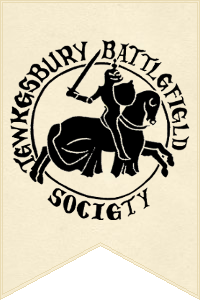April 14th 1471: The Battle of Barnet
The Battle of Barnet
(Graham Turner: Studio 88)
Edward’s army followed his fore-riders through Barnet in the growing gloom. ‘And, for it was right dark, and he might not well see where his enemies were embattailed afore him, he lodged him, and all his host, afore them, much nearer then he had supposed, but he took not his ground so even in the front afore them as he wold have done if he might better have seen them, but somewhat a-side-hand, where he disposed all his people, in good array, all that night’.
Warwick was aware that they were close and trained his guns on them, shooting through the night. Edward was much nearer than he thought, though, and the guns overshot, doing no damage. The Yorkist force was ordered to stay very quiet.
At the first glimmer of light, at four or five in the morning, and in a great mist, Edward attacked. ‘he committed his cause and quarrel to Almighty God, advanced banners, did blow up trumpets, and set upon them, first with shot, and, then and soon, they joined and came to hand-strokes’. As hand-to-hand fighting started, the overlapping of the armies cause confusion in the mist and the Earl of Oxford’s forces overwhelmed Lord Hastings on the west side of the battlefield. Hastings broke, and fled towards London, under hot pursuit. Such was the confusion caused by the mist that no-one seemed to notice and it had no effect on the Yorkists to see their comrades in retreat.
On the east of the field, the overlap went the other way. The Duke of Gloucester advanced and swung around to attack the Duke of Exeter’s forces. Warwick managed to stabilise his force, but at the expense of the axis of the battle swinging around, which caused confusion when Oxford returned to the field, having chased Hastings’ men and then sacked the baggage train. Because no-one was where he expected them to be, he attacked Montague’s men who were in a place where he had expected Yorkists. This was the turning point of the battle. Edward gained the ascendancy and won the day, after three hours of fighting.
‘In this battle was slain the Earl of Warwick, somewhat fleeing, which was taken and reputed as chief of the field, in that he was called amongst them lieutenant of England, so constitute by the pretended authority of King Henry. There was also slain the Marques Montague, in plain battle, and many other knights, squires, noble men, and other. The Duke of Exeter was smitten down, and sore wounded, and left for dead; but he was not well known, and so left by a little out of the field, and so, after, he escaped. The Earl of Oxford fled, and took into the country, and, in his fleeing, fell in company with certain northern men, that also fled from the same hide, and so went he, in their company, northwards, and, after that, into Scotland.’
After the battle was won, Edward regrouped in Barnet and marched back to London, where he was received with ‘much joy and gladness’. ‘And so rode he forth straight unto Paul’s at London, and there was received with my Lord Cardinal of England, and many other bishops, prelates, lords spiritual, and temporal, and other, in great number, which all humbly thanked and loved God of his grace, that it pleased him that day to give to their prince, and sovereign lord, so prosperous a journey, whereby he had surprised them that, of so great malice, had procured and laboured at their powers his utter destruction, contrary to God, and to their fathers and allegiances.’ (This and all quotes above are from the Arrivall)
Though he didn’t know it then, a new storm cloud was rising in Dorset, where Queen Margaret and Prince Edward had at last stepped foot back on English soil, at Weymouth, to be met by those staunch Lancastrians, the Duke of Somerset and the Earl of Devonshire.

